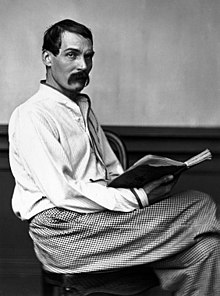Sir Richard Burton | |
|---|---|
 Burton in 1864 | |
| British consul in Fernando Pó | |
| British consul in Santos | |
| British consul in Damascus | |
| British consul in Trieste | |
| Personal details | |
| Born | 19 March 1821 Torquay, Devon |
| Died | 20 October 1890 (aged 69) Trieste, Austria-Hungary |
| Nationality | British |
| Spouse | |
| Alma mater | Trinity College, Oxford |
| Signature | |
| Nickname | Ruffian Dick |
| Military service | |
| Allegiance | |
| Branch/service | Bombay Army |
| Years of service | 1842–1861 |
| Rank | Captain |
| Battles/wars | Crimean War |
| Awards | Knight Commander of the Order of St Michael and St George and Crimea Medal |
| Writing career | |
| Pen name |
|
| Notable works |
|
Captain Sir Richard Francis Burton, KCMG, FRGS, (19 March 1821 – 20 October 1890) was a British explorer, writer, scholar and military officer.[1][2] He was famed for his travels and explorations in Asia, Africa and South America, as well as his extensive knowledge of languages and cultures, speaking up to 29 different languages.[3]
Born in Torquay, Devon, Burton joined the Bombay Army as an officer in 1842, beginning an eighteen-year military career which including a brief stint in the Crimean War. He was subsequently engaged by the Royal Geographical Society (RGS) to explore the East African coast, where Burton along with John Hanning Speke led an expedition to discover the source of the Nile and became the first European known to have seen Lake Tanganyika. He later served as the British consul in Fernando Pó, Santos, Damascus and Trieste.[4] Burton was also a Fellow of the RGS and was awarded a knighthood in 1886.[5]
His best-known achievements include undertaking the Hajj to Mecca in disguise, translating One Thousand and One Nights and The Perfumed Garden, publishing the Kama Sutra in English and attempting to discover the source of the Nile. Although he abandoned his university studies, Burton became a prolific and erudite author and wrote numerous books and academic articles on subjects such as human behaviour, travel, falconry, fencing, sexual practices and ethnography.[6]
- ^ de la Fuente, Ariel (31 October 2023). "Sir Richard Burton's Orientalist Erotica". Borges, Desire, and Sex. Liverpool University Press. pp. 84–108. doi:10.2307/j.ctvhn09p9.9. ISBN 9781786941503. JSTOR j.ctvhn09p9.9. S2CID 239794503.
- ^ "Sir Richard Francis Burton". freemasonry.bcy.ca. Retrieved 5 September 2024.
- ^ Young, S. (2006). "India". Richard Francis Burton: Explorer, Scholar, Spy. New York: Marshall Cavendish. pp. 16–26. ISBN 9780761422228.
- ^ Cite error: The named reference
:0was invoked but never defined (see the help page). - ^ "Historic Figures: Sir Richard Burton". BBC. Retrieved 7 April 2017
- ^ Burton, I.; Wilkins, W. H. (1897). The Romance of Isabel Lady Burton. The Story of Her Life. New York: Dodd Mead & Company. Archived from the original on 29 January 2018. Retrieved 28 January 2018.